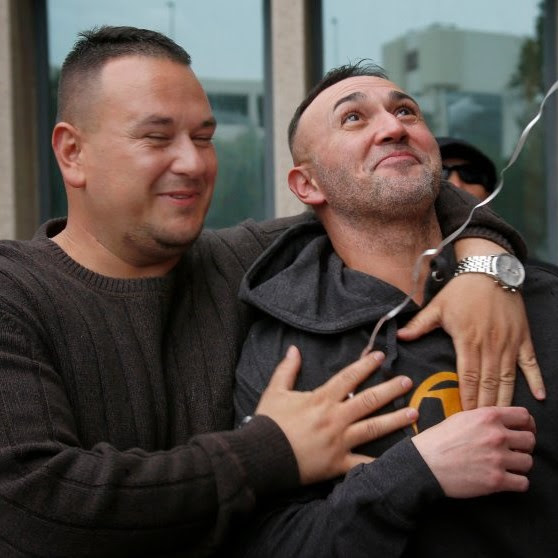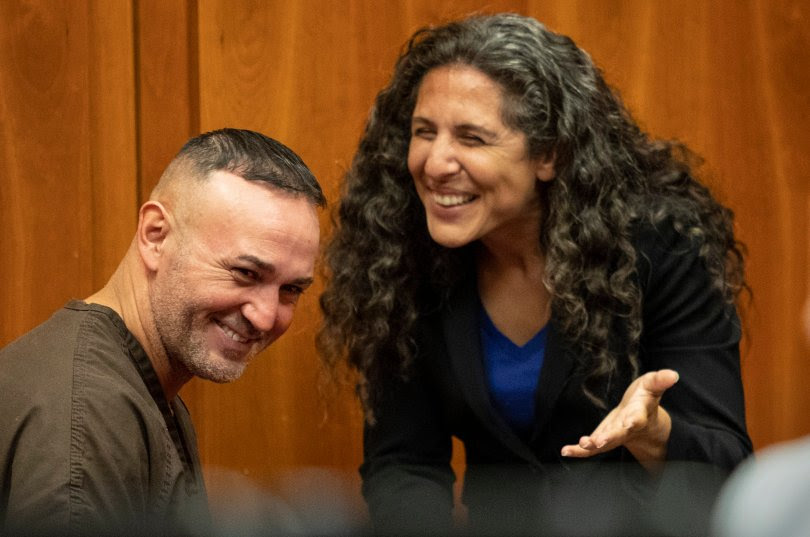SANTA CLARA, Calif., May 15, 2019— A man wrongfully convicted in a 2002 shooting has had his conviction reversed based on newly discovered evidence, uncovered by the Northern California Innocence Project (NCIP) and the Santa Clara County District Attorney’s Office, about a crucial eyewitness identification.

Lionel Rubalcava (right), a free man for the first time in 17 years is embraced by his brother Rolando Rubalcava. (Karl Mondon/Bay Area News Group)
On April 2, 2002, a young man was gunned down in a drive-by shooting in front of his younger brother. While he was recovering from severe injuries in the hospital, the victim identified 22-year-old Lionel Rubalcava as the shooter from a photo lineup. The brother also identified Rubalcava, who was in the lineup for being at the wrong place at the wrong time: he had stopped in front of the victim’s house two days after the shooting.
At the three-day trial, Rubalcava provided powerful alibi evidence and testified to his innocence. But the victim and his brother both pointed to Rubalcava as the shooter. The jury, which deliberated for longer than the trial lasted, found Rubalcava guilty of attempted murder. He was sentenced to life in prison based solely on the two eyewitness identifications.
NCIP teamed up with investigators Dre McEwen and Grant Fine and pro bono partners at Simpson Thacher to investigate Rubalcava’s case. The team put together information showing the eyewitness identifications were unreliable and that Rubalcava should never have been convicted.
NCIP presented the case to the Conviction Integrity Unit in Santa Clara District Attorney’s Office, a special unit devoted to correcting wrongful convictions in the county. Assistant District Attorneys David Angel and Stacey Capps immediately saw the need to investigate the case further.
Among the new information the DA’s office found was the stunning admission by the victim, who was paralyzed and has worked hard to overcome what he has been through, that he had never been completely sure of his identification. He told them that he had only seen a tiny portion of the shooter’s face–and only for a brief moment before he was shot.
“The more we all dug, the more evidence of innocence we found. Every person we spoke to, every tape we transcribed, every new document we uncovered pointed to Lionel’s innocence,” said NCIP’s attorney on this case, Paige Kaneb.

Lionel Rubalcava talks with NCIP attorney Paige Kaneb before his attempted murder conviction was dismissed. (Karl Mondon/Bay Area News Group)
The District Attorney’s Office said the new evidence was pivotal, “Had we known this at the time, we would not have filed the case.”
Rubalcava’s ability to get his conviction reversed hinged on the passage of a new law that NCIP helped get passed on September 30, 2016. That law, Senate Bill 1134 authored by Senators Leno and Anderson, loosened laws that had previously made it virtually impossible for wrongfully convicted people to get a new trial based on new evidence. Instead of the new evidence needing to “point unerringly to innocence”, the new law requires only that —had the new evidence been available at the original trial— there would “more likely than not” have been a different outcome. As the District Attorney’s Office noted when it joined NCIP in asking the court to reverse Rubalcava’s conviction, “The foundation of our democracy and criminal justice system is the presumption of innocence.”
This bill was sponsored by the California Innocence Coalition that includes NCIP, the California Innocence Project in San Diego, and Loyola Project for the Innocent in Los Angeles.
On April 24, 2019—17 years and 16 days after Rubalcava was arrested— his conviction was reversed by Judge Nishigaya in the Superior Court of the State of California for Santa Clara County. On Wednesday, May 15, it is expected that charges against Rubalcava, who has been residing in Pleasant Valley State Prison, will be dropped and he will be freed from county jail shortly thereafter.
About the Northern California Innocence Project (NCIP)
NCIP is a non-profit clinical program of Santa Clara University School of Law whose mission is to promote a fair, effective, and compassionate criminal justice system and protect the rights of the innocent. Since its inception in 2001, NCIP has processed over ten thousand requests for inmate assistance, investigated hundreds of cases, pursued litigation or collaborative resolution in dozens, and obtained the freedom of 26 wrongfully convicted individuals. Learn more at ncip.org.
NCIP Case Contact
Paige Kaneb | NCIP | (408) 551-3258 | pkaneb@scu.edu
Media Contact
Lori Stone | NCIP | (408) 551-3254 | lstone@scu.edu
